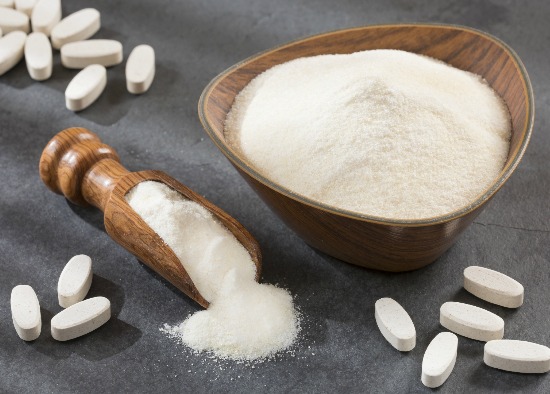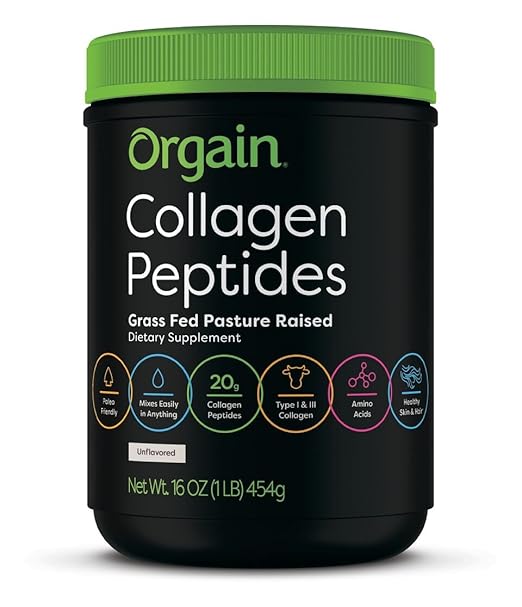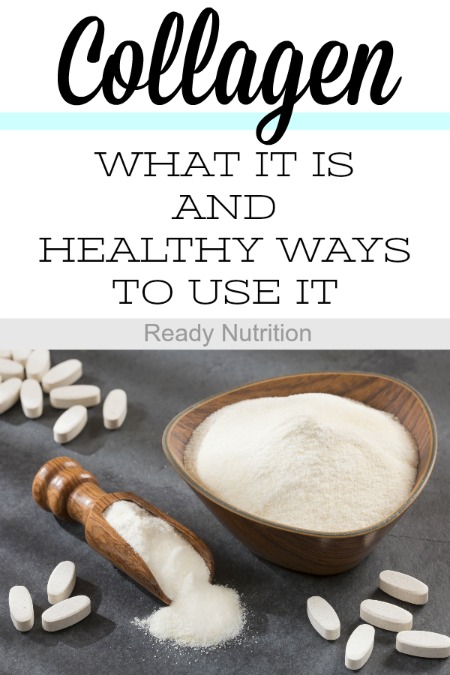
Collagen is basically a structural protein, and it is found in the connective tissue of animals. It is used in many different structures throughout a body (and in man): tendons, ligaments, bone, blood vessels, and supporting tissues for skin and organs. It also accounts for 5 to 6% of the weight of muscle tissue. From a perspective of supplementation, we’re going to concern ourselves with Type I (covers organs, bone, skin), and Type III (that is present with Type I, and made of reticulate fibers, very important for support of other tissues).
Collagen is harvested from bovines (taken from cattle), and it is full of protein and just about every amino acid you can think of…including some important ones, such as Glycine and Serine. These latter are crucial for protein building in the human body. Collagen supplements also have the BCAAs (Branched-Chain Amino Acids) that are essential for when you work out…these three (as mentioned in other articles) can be converted by the body directly into Glycogen and then into Glucose during a workout.
This latter function/utilization of the BCAAs saves your own body’s Glycogen stores from being utilized if you pre-load them prior to working out. This is very fascinating for me personally, as I don’t like the feeling of fullness/bloat attached to taking a shake prior to a workout, and I use the BCAAs in another form. I am hoping that the collagen will be able to be used (by me) prior to workout, as it is tasteless and can be taken with water readily.
 The collagen is utilized by the human body for its outstanding amounts of amino acids. I just found a type called Orgain, which is available on Amazon for $25 for a 1-lb container that gives 23 servings, and it looks really promising. It is taken from grass-fed, pasture-raised cattle (from collagen peptides), and it is really complete as far as a supplement goes. A serving of it has 18 grams of protein, and as I mentioned, it is taken in water easily and readily.
The collagen is utilized by the human body for its outstanding amounts of amino acids. I just found a type called Orgain, which is available on Amazon for $25 for a 1-lb container that gives 23 servings, and it looks really promising. It is taken from grass-fed, pasture-raised cattle (from collagen peptides), and it is really complete as far as a supplement goes. A serving of it has 18 grams of protein, and as I mentioned, it is taken in water easily and readily.
Now, we’re going to digress for a moment here. There is a way to produce HGH (Human Growth Hormone) in the human body without injections or steroids (both of which I do not and have not ever used). Alanine, Glycine, Lycine, and Ornithine…when taken at night, these will stimulate HGH production in your body. HGH is vital in everything you do, from your immune system to tissue repair. It is the subject of another article. Ornithine you’ll need to pick up, but it’s about $12 a bottle, and that should last you 3 months or more.
The point is, when you take this collagen, you’ll be getting all of those ingredients to promote HGH formation in your own body, in a natural way…at your body’s own speed. This is what I intended it for, and I’m also going to try it as a substitute for the BCAA powder I usually take pre-workout, to see what happens…as it has the BCAAs and more stuff that may help me…so it’s an “ongoing experiment” that the verdict is not in yet.
But collagen does a lot more than just supplement your needs for physical training. For the ladies who may be interested: it supports the skin and it’s integrity, and helps to protect against wrinkles as you age…as one of the main reasons for wrinkling is collagen (lack thereof) and a decline in skin elasticity. Elastin and fibrillin are also produced by it that helps your skin maintain its structure.
It is good for the joints: the ligaments and tendons are supplemented. It relieves joint pain, helps prevent bone loss, and builds muscle protein. It strengthens the heart and can help to slow the processes associated with aging. These are all excellent reasons to try something that can help your physical training, and also give you an advantage with the normal aches and pains of daily life. Try it out, and any comments you may have on your own experiences with it will be welcomed. JJ out!

